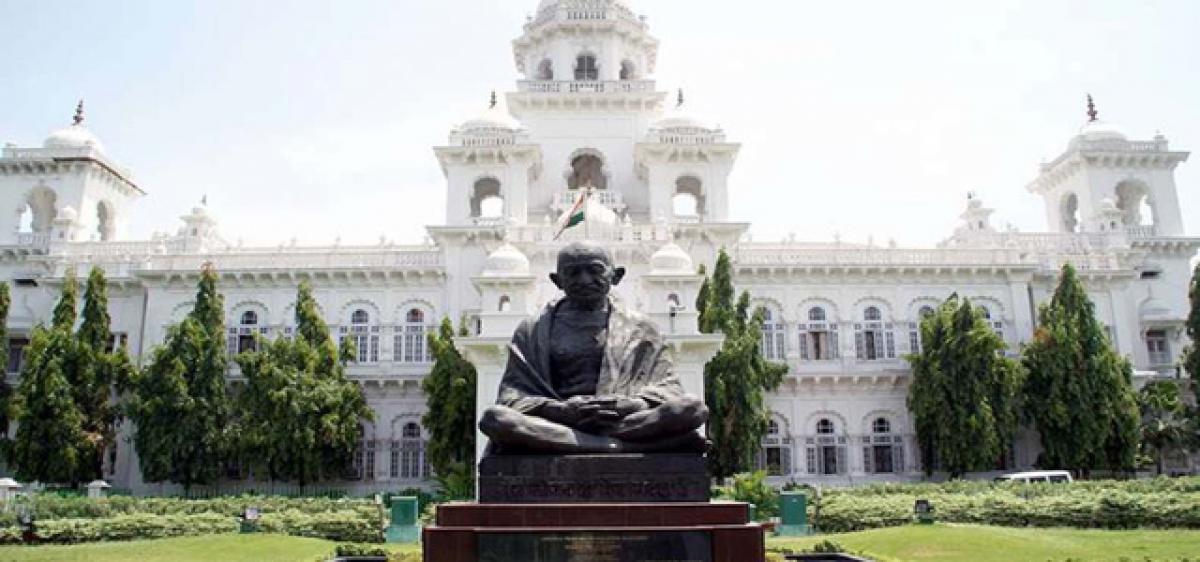Live
- Beyond The Flames
- CM warns officials of stringent action
- Congress killers of Samvidhan: Modi
- Bejan Daruwalla’s horoscope
- Study warns: Ultra-processed foods may accelerate biological age
- CM pledges more political opportunities to Madigas
- Vizag attracts tourists as much as Kashmir
- Year-Ender 2024 Guide: Home remedies to relieve Period Pain.
- All India crafts mela begins today
- TTD gears up for Vaikunta Ekadasi fete
Just In

It is rare for all political parties to come together on any single issue. It is more so in Telangana State where the ruling party towers over all other opposition parties when it comes to numbers in the Legislative Assembly, implying that it can virtually bulldoze its way into achieving its set agenda.
It is rare for all political parties to come together on any single issue. It is more so in Telangana State where the ruling party towers over all other opposition parties when it comes to numbers in the Legislative Assembly, implying that it can virtually bulldoze its way into achieving its set agenda.
However, when matters assume political overtones, particularly when certain issues are critical to their very survival (read it as keeping the vote-bank in good humour) a remarkable oneness gets demonstrated.
An issue that is bringing all parties on the same side is presently doing the rounds and gathering momentum in the State. The reasons are apparent-Muslims, as a vote-bank, have perennially emerged as king-makers. In most elections, their support can be the clincher.
Tapping them and to be seen as being on their side is what is currently being played out in the State, The Telangana government is mulling to pass a resolution in the Legislative Assembly during the ongoing Winter Session with regard to reservations for Muslims and sending it to Parliament so that it could be included in Schedule IX.
"On account of the exhaustive research done by the Commission of Inquiry, fresh data is available which shows the backwardness of the Muslim community. Empirical data can be presented to the Centre to substantiate this argument," opine official sources.
And what do we have? Apart from overwhelmingly welcoming the decision, the opposition parties feel that unless the government makes serious efforts and prevails upon the Centre to take necessary procedures, which includes amendment to the Constitution, it cannot fulfill its promise.
Passing a resolution in the Assembly is no big task given the sensitivity of the subject. However, it requires a lot of persuasive dexterity to prevail upon the Centre. Hence, the big question now is whether this could see the light of the day in Telangana, more so when the TRS-led government is neither a pal of the NDA government nor opposed to its policies.
The general opinion is that it can be implemented if the TRS government musters the political will and puts forth strong arguments in its favour before the Supreme Court. Moreover, there is a precedent. The formula now is in orchestrating the “When Tamil Nadu Assembly could achieve it, why not Telangana”? chant.
But then the question is will the Centre agree to include it under IX schedule when the talk is that some Sangh bodies are for doing away with reservations. A look back into the developments indicates that the four percent quota came after heavy dilly-dallying, including a 2005 attempt by the YSR government to bring in five percent reservation for Muslims.
While striking down the proposal, the Andhra Pradesh High Court stated that five percent quota violated a 1992 Supreme Court judgement (Indira Sawhney vs Union of India) that stated that the total reservations should not exceed 50%. Given this backdrop, the road ahead could be bumpy from the start, caution Congress leaders from the State.
Now the question is how did Tamil Nadu manage to accomplish such a feat? Or the Haryana Assembly, which passed a Bill in March last year to provide 10 percent reservation in government jobs and educational institutions to Jats and five other castes in the State.
In 1971, the DMK government hiked the reservation for the Backward Classes from 25 to 31 percent and for the Scheduled Castes and Scheduled Tribes from 16 to 18 percent. In 1980, the AIADMK government increased the reservation for the Backward Classes from 31 to 50 percent. From then on, there has been 69 percent reservation in educational institutions.
In the special Session of Tamil Nadu Legislative Assembly held on November 9, 1993, it was unanimously resolved to call upon the Union Government to take steps immediately to bring in a suitable amendment to the Constitution and ensure continuation of the 69 percent reservation in government services and educational institutions.
In view of the importance and ‘sensitive’ nature of the matter, the Union Home Minister held meetings with leaders of all political parties on July 13, 1994 to discuss the provisions of the Bill. The consensus among the leaders (the vote-bank syndrome at work again) was that the Bill should be assented to. Accordingly, the President gave his assent to the Bill on July 19, 1994.
The Tamil Nadu Government urged the Centre on July 22, 1994 that the Tamil Nadu Act 45 of 1994 should be included in the Ninth Schedule to the Constitution of India. Subsequently, it was brought within the purview of the Ninth Schedule of the Constitution for getting protection under Article 31B of the Constitution.
The question now is will TRS be able to convince and make the Centre take a similar view? Meanwhile, depending on the outcome, we could witness a new political drama getting unfolded. A thumbs-up from the Centre would see parties taking credit for the ‘extraordinary feat’, while a rejection would open the floodgates for a new blame-game chapter running through till the next elections.
By V RAMU SARMA

© 2024 Hyderabad Media House Limited/The Hans India. All rights reserved. Powered by hocalwire.com







